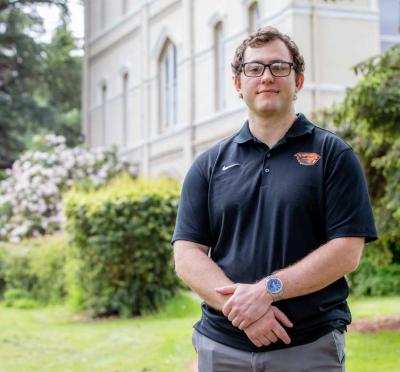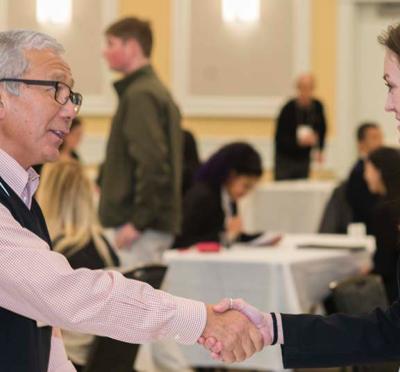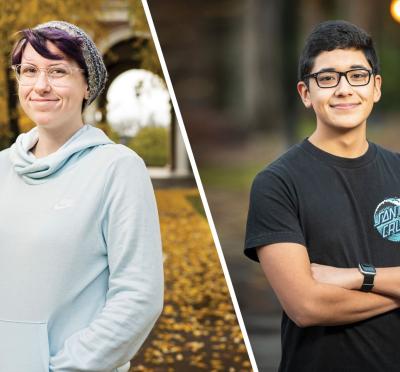
This spring, for our next edition of the Leadership Academy Alumni Spotlight Series, we had the chance to catch up with Molly Carpenter '19, who graduated from OSU in bioengineering and now works at Genentech in San Francisco as an associate engineer in their two-year Process Development Rotational Program. During her time at OSU, Molly was a COE student ambassador, served as the Program Management Intern for the Leadership Academy, was a member of the Honors College, worked in research in Dr. Skip Rochefort's lab, and was a member of SWE and the CBEE club. Read on for Molly's memories of the Leadership Academy, and to learn more about the great work she does now!
How did you first get involved with the Leadership Academy?
I first joined the Leadership Academy at the beginning of my Junior year. I learned about it through my job as a College of Engineering tour guide. To me, it made a lot of sense to try to supplement professional and soft skills that I was gaining organically with other resources.
What advice would you give to students who are in the Leadership Academy, or who are new to it?
The requirements can definitely feel daunting when you first begin the program, but as long as you work toward it steadily they are very achievable. It also helps a lot to begin the program within the first couple years at Oregon State simply to give yourself more time. I know that I got a lot more out of sessions/workshops when I engaged with them rather than sitting as a passive observer. I tried to ask at least one thoughtful question at each session, which is a very achievable goal but just makes you think a little more deeply about the content you’re hearing.
In what ways have you been able to incorporate some lessons from the Leadership Academy into your current work at Genentech?
I think that one of the biggest lessons from the Leadership Academy didn’t come from a specific pillar or workshop. I think being in the program showed me that your experience either in school or at work is impacted by much more than the classes you take or the specific role that you have on paper. Learning to take advantage of opportunities that are available to you so you can continue growing holistically is an underlying message from the Leadership Academy and is something that I’ve continued to try to do in my professional life. I am fortunate to work somewhere that offers numerous engagement opportunities, be that through networking events, workshops (much like the ones in the LA), professional development classes and seminars, or volunteer opportunities. By engaging in things outside of my day to day job I feel much more integrated in the workplace community and am continuing to grow my soft skills.
What were some of your favorite parts of the program? What did you enjoy?
I think the Leadership Academy Summit is a really unique experience offered to OSU students. Although I never attended the summit myself before helping organize it in 2018, I think it is a really high impact event and really enjoyed being a part of it.
How do you think the Leadership Academy most impacted you?
The most impactful part of the Leadership Academy for me was working as the Program Management Intern during my Senior year. This unique opportunity taught me a lot about effective communication and allowed me to connect further with visiting industry speakers. Working in this capacity actually allowed me to use the soft skills/ professionalism that the workshops try to teach.
Can you describe your title and the work you do at Genentech?
At Genentech I am an associate engineer in the Process Development Rotational Program. This role is specifically for people within two years of graduation and allows associates to spend four, six-month rotations in departments across Pharma Technical Development (PTD) at our headquarters in South San Francisco. PTD is a really exciting organization to be a part of because this is where the molecules that are discovered by our scientists become medicines that can be manufactured on a commercial scale.
As you’ve started working, what have been some opportunities and challenges for you in your role?
The biggest challenge that comes with this role is that you are constantly learning new skills as you switch between projects every six months. Right when you begin to feel that you really have a handle on your project and department you leave and start from ground zero again, in a new department, with a new manager, and new challenges. It can be really scary to be thrown onto a project that has almost nothing to do with anything you studied in school (for example being placed in Protein Analytical Chemistry as a Bioengineer) but feeling vulnerable is what leads to the most growth.
What’s great about this program is that within two years I will have held four different engineering positions and have a really versatile skill set to apply to my eventual long-term role. PDRP’s are given high visibility, business critical projects which, though they can be stressful, are very rewarding. In addition, because you are moving between groups so frequently, you are constantly growing your network which helps with feeling integrated in the company, and can help with future career moves and aspirations.
Molly Carpenter is an associate engineer with Genentech in South San Francisco, CA. Click here to learn more about Genentech.
Photo courtesy of Molly Carpenter



